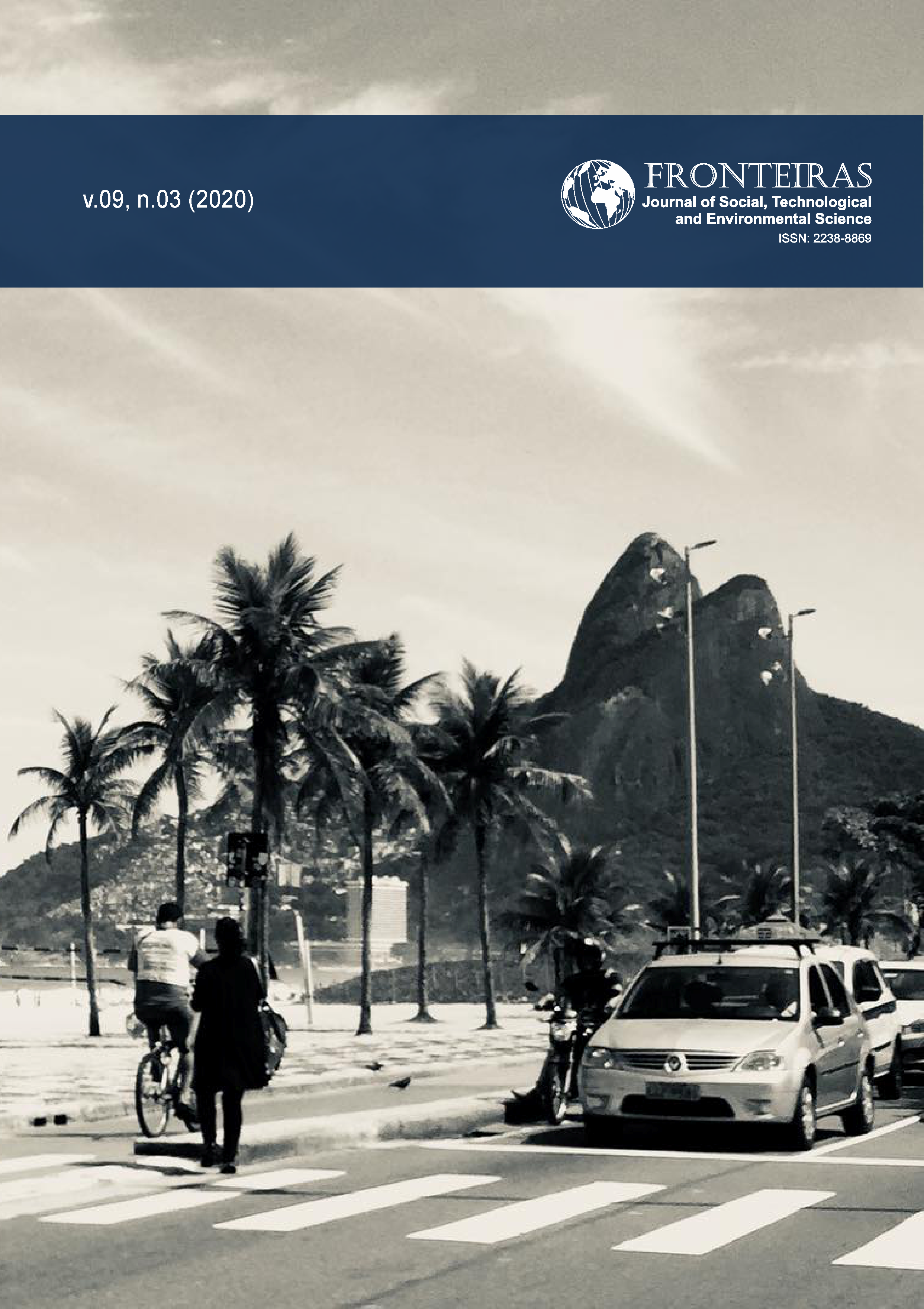La Influencia de la Logistica Verde en el Mundo de los Negocios Internacionales
DOI:
https://doi.org/10.21664/2238-8869.2020v9i3.p99-112Palavras-chave:
Comercio Exterior, Gobierno, Logística Verde, Globalización, Economía CircularResumo
El objetivo de este artículo es analizar la importancia de la logística verde en el comercio exterior, basado en la internacionalización y comercialización de los productos, implicando en los últimos años un deterioro medioambiental. Las actuales tendencias empresariales y comerciales, por efecto de la globalización, han generado la necesidad de implementar herramientas y alternativas para poder llegar al mercado internacional, teniendo factores inmersos en los negocios internacionales como son las operaciones de exportación e importación permitiendo el intercambio comercial; sin importar los daños que causen al ecosistema, situación que compromete a toda la humanidad y que pocos toman conciencia de este tema, que hoy se convierte en una prioridad de las agendas internacionales de los países. Las estrategias de las empresas para incrementar su competitividad se inscriben en el eje empresa, gobierno, país y bloque económico, donde las decisiones que tomen los consumidores, suponen un impacto sobre el planeta, pudiendo determinar como la logística verde toma relevancia en el mundo actual, y como las problemáticas medioambientales pasan hacer un tema prioritario no solo para el país sino para los actores de la cadena logística.
Referências
Bai, Chunguang, and Joseph Sarkis. 2017. “Improving Green Flexibility through Advanced Manufacturing Technology Investment: Modeling the Decision Process.” International Journal of Production Economics 188 (June): 86–104. https://doi.org/10.1016/j.ijpe.2017.03.013.
BID. 2015. “Logística Sostenible.” Banco Interamericano de Desarrollo. 2015. http://logisticsportal.iadb.org/node/2023.
Cabeza, Domingo. 2012. Logística Inversa En La Gestión de La Cadena de Suministro. Barcelona: Marge Books.
Carrasco-Arias, Javier. 2000. “Evolución de Los Enfoques y Conceptos de La Logística: Su Impacto En La Dirección y Gestión de Las Organizaciones.” Economía Industrial 331 (1): 17–33. https://www.mincotur.gob.es/Publicaciones/Publicacionesperiodicas/EconomiaIndustrial/RevistaEconomiaIndustrial/331/06.JAVIER CARRASCO.pdf.
Chauhan, Ankur, and Amol Singh. 2016. “A Hybrid Multi-Criteria Decision Making Method Approach for Selecting a Sustainable Location of Healthcare Waste Disposal Facility.” Journal of Cleaner Production 139 (December): 1001–10. https://doi.org/10.1016/j.jclepro.2016.08.098.
Comisión Europea. 2013. “La ECOINNOVACIÓN En El Corazón de Las Políticas Europeas.” Ec.Europa.Eu. https://ec.europa.eu/environment/ecoap/about-action-plan/objectives-methodology_es. 2013.
Correa, A. 2013. Generalidades Del Comercio Internacional. Medellín: Centro Editorial Ensumer.
Dávila, Manuel del Moral, and Brianda Campero Calderón Gutiérrez. 2013. “El Impacto Ambiental de Los Procesos Logísticos.” É Logística - Revista Énfasis, December 2013. http://www.logisticamx.enfasis.com/articulos/68590-el-impactoambiental-los-procesos-logistcios.
Diamond, Jared. 2007. Colapso: Por Qué Unas Sociedades Perduran y Otras Desaparecen. Barcelona: Debolsillo.
Estrada-Jerez, Karla, Vianey Torres Argüelles, Aurora Máynez, and Maria Teresa Escobedo. 2015. “Logistica Inversa y Sustentabilidad: Revisión de Literatura.” CULCyT - Cultura Científica y Tecnológica 12 (55 (Especial 1)): 34–45.
Graça, Paula, and Luís M. Camarinha-Matos. 2017. “Performance Indicators for Collaborative Business Ecosystems — Literature Review and Trends.” Technological Forecasting and Social Change 116 (March): 237–55. https://doi.org/10.1016/j.techfore.2016.10.012.
Handfield, Robert B., Ernest Z. Nichols, and Ernest L. Nichols. 1999. Introduction to Supply Chain Management. New Jersey: Prentice Hall.
Held, David, and David Goldblatt. 2002. Transformaciones Globales: Poitica, Economia y Cultura. Oxford: Oxford University Press.
Hobsbawm, Eric. 1994. Historia Del Siglo XX. Edited by Editorial Crítica. Buenos Aires.
Ministerio de Ambiente y Desarrollo Sostenible. 2016. “Protocolo de Kioto (PK).” Bogotá. 2016. http://www.minambiente.gov.co/index.php/component/content/article/458-plantilla-cambio-climatico-14.
National Geographic. 2007. “¿Es El Fin de La Era Del Petróleo?” National Geographic 22 (6). https://www.nationalgeographic.com.es/mundo-ng/grandes-reportajes/es-el-fin-de-la-era-del-petroleo_3161.
Peng, Xuerong, and Yang Liu. 2016. “Behind Eco-Innovation: Managerial Environmental Awareness and External Resource Acquisition.” Journal of Cleaner Production 139 (December): 347–60. https://doi.org/10.1016/j.jclepro.2016.08.051.
Rodrigue, Jean-Paul, Brian Slack, and Claude Comtois. 2001. “Green Logistics (The Paradoxes Of).” In The Handbook of Logistics and Supply-Chain Management, edited by A. M. Brewer, K. J. Button, and D. A. Hensher, 2 de Handb:339–50. London: Pergamon/Elsevier.
Rugman, Alan M., and Richard M. Hodgetts. 1997. Negocios Internacionales: Un Enfoque de Administración. Edited by Mc Graw Hill. México.
Sosa, Carlos. 2008. Gestión de La Logística Integral. Mexico: Editorial Mc Graw Hill.
Spiegel, Der. 2008. “Australien Veröffentlicht Schockierende Walfang-Bilder.” Spiegel.De. SPIEGEL Wissenschaft. 2008. https://www.spiegel.de/wissenschaft/natur/japans-jagd-auf-meeressaeuger-australien-veroeffentlicht-schockierende-walfang-bilder-a-533708.html.
Wallerstein, Immanuel. 1999. El Capitalismo ¿Qué Es? Un Problema de Conceptualización. México: Universidad Nacional Autónoma de México.
Yasui, Tadashi. 2012. “Customs Environmental Scan 2012.” WCO Research Paper No. 23. Vol. 23.
Downloads
Publicado
Como Citar
Edição
Seção
Licença
Esta revista oferece acesso livre imediato ao seu conteúdo, seguindo o princípio de que disponibilizar gratuitamente o conhecimento científico ao público proporciona maior democratização mundial do conhecimento.
A partir da publicação realizada na revista os autores possuem copyright e direitos de publicação de seus artigos sem restrições.
A Revista Fronteiras: Journal of Social, Technological and Environmental Science segue os preceitos legais da licença Creative Commons - Atribuição-NãoComercial 4.0 Internacional.


